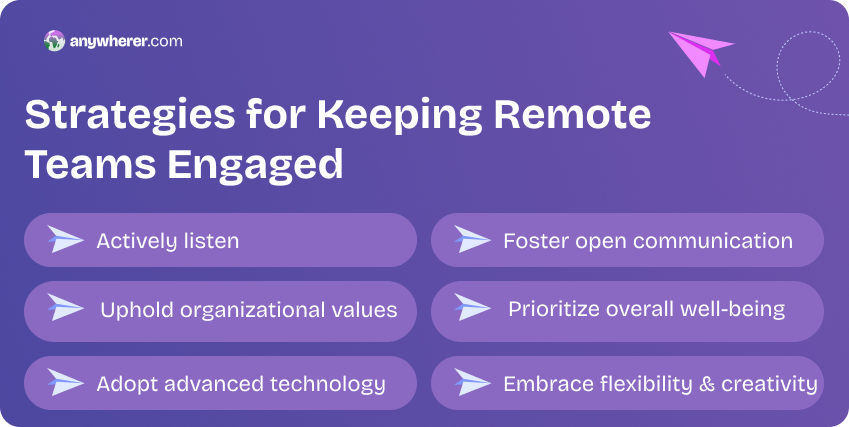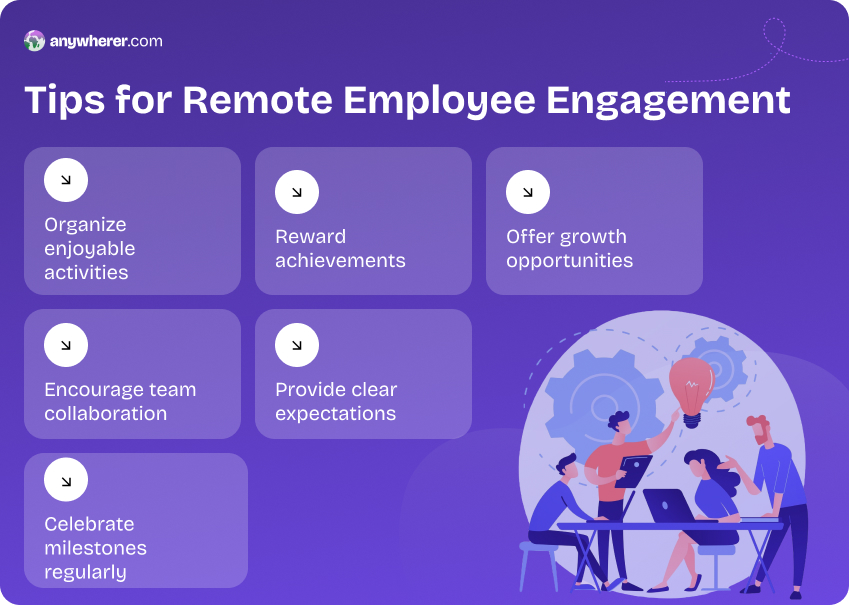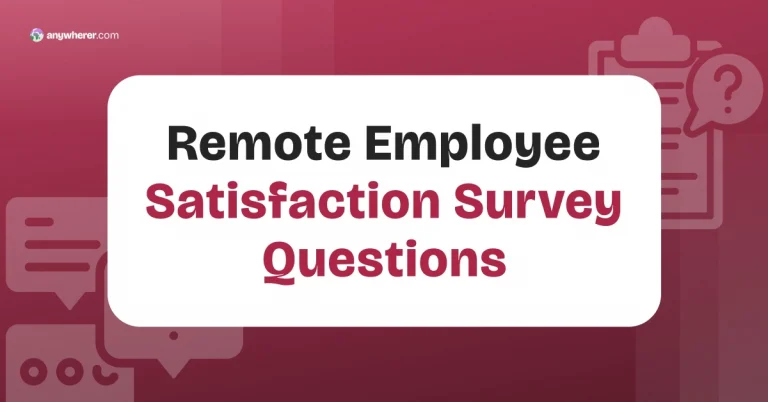Engaging Remote Teams: What the Data Tells Us
If you came here looking for creative ways on how to engage remote employees or how to stay engaged working from home, you have come to the right place. In this article, we are going to look at the importance of engaging remote workers, as well as explore the different engagement activities for remote employees.
Engaging remote employees is crucial for maintaining productivity and job satisfaction. Here are some interesting facts and statistics on this topic:
- Increased productivity: remote employees often report higher productivity levels. A study by Owl Labs revealed that 74% of employees feel happier when they work remotely, which can lead to increased productivity.
- Work-Life balance: remote work significantly enhances work-life balance. According to Forbes, 71% of remote workers stated that working remotely helps balance their work and personal life.
- Employee retention: offering remote work options can reduce employee turnover. Companies that support remote work experience a 25% lower employee turnover rate.
- Employee engagement: remote work can positively impact employee engagement. Recent research shows that exclusively remote employees tend to report higher engagement levels than those working on-site (37% feel engaged vs. 30%).
- Cost savings: remote work can lead to significant cost savings for both employees and employers. Employees save on commuting costs, while employers can reduce overhead expenses.
- Talent attraction: offering remote work options expands the talent pool. Organizations can recruit employees from around the globe, allowing for greater diversity of thought, age, race, and abilities.
Implementing effective remote work strategies can lead to a more engaged, productive, and satisfied workforce, benefiting both employees and organizations.
Benefits of Supporting Remote Workers
Today, workers, especially those in the software engineering and development field are looking for much more than an attractive salary and benefits. Whilst one cannot discount these standard perks play a major role, Gen Z employees tend to lean towards a work culture that offers both intrinsic and extrinsic motivators.
Here are three major benefits of managing people remotely.
Increased productivity
One of the primary benefits of keeping IT staff engaged is that it helps increase their overall productivity. Today, more and more companies are discovering that workers are willing to walk the extra mile in exchange for the privilege to work remotely. A recent study shows that 53% of workers are willing to work extra time when operating remotely, with 28% of on-site employees willing to do the same. The same study shows that 45% of remote workers are able to accomplish more compared to when working on-site.
Reduced employee turnover
This may sound a bit contradicting but sending workers home is a great incentive to keep them around in the long haul. True to this, a national survey conducted in the US reported that 73% of remote workers had higher job satisfaction compared to their on-site counterparts. Along with that, 53% of remote employees in the U.S. have indicated they aren’t planning to leave their jobs in the near future. This compared with 54% of in-house workers who reported they are on the hunt for a new workplace.
Increased savings
Managing and empowering a distributed software development team saves both the organization and employees a lot in terms of money and time. On the one hand, the company saves in terms of office furniture, electricity, janitorial services, real estate, technology investment, and other overhead costs. Workers, on the other hand, can save up to $7,000 annually on transportation, child care, clothes, and food compared to their office-bound peers.
To underscore the importance of working remotely, a recent study by Global Workplace Analytics shows that 50% of the entire U.S. workforce can save up to $700 billion annually working from home at least half of the time.
Now that we have seen the benefits of remote working support, let’s now transition into how to make remote employees feel connected.
10 Easy and Creative Ways to Engage and Motivate Remote Employees
As a manager, learning how to keep a remote team engaged is easier said than done. This is especially the case in the IT field where there’s a stinging skills shortage, with multiple companies that have deeper pockets hiring dedicated development team/s right, left, and center.
Although there are major differences between managing remote staff and keeping them motivated, paying attention to the subtle things can hugely slat the playing field to your advantage.

Below, we have compiled a list of 10 practical remote staff IT management tips that you can try:
Listen
When it comes to supervising remote employees and motivating team members, one man’s meat could be another’s poison. For this reason, it is important for you as a business owner or manager to pay attention to the needs and interests of each employee.
What motivates an accountant may not necessarily work for a software engineer. Still, what motivates one software developer may not necessarily tickle another. Worst still, software engineers spend most of their time working on huge projects rather than in meetings, which is why it’s important to keep on engaging them in one-on-one and virtual conversations to understand their interests.
Reinforce organizational values
Even before the onset of the COVID-19 crisis, companies were increasingly starting to treat their employees as primary stakeholders of their enterprises. During and even after this crisis, you can continue showing employees that you are willing to walk with them for the long haul.
And one of the best work from home engagement ideas to do so is to reinforce the values of creating a fun and lively environment for the employees that you have built over the years. Along with that, continue modeling and ingraining positive behaviors among the employees by calling out unethical conduct. Still, you need to put in place systems and channels for reporting professional misconduct, as well as establish punitive measures for failure to comply.
Decentralize authority and project ownership
Whether you are working with software engineers or any other professionals, failing to decentralize authority and projects could lead to missing out on great workers. As indicated earlier, most workers today are looking for both intrinsic and extrinsic motivators, and both freedom and a strong sense of autonomy are a huge part of the equation. If you are overly obsessed with punching a clock every clock, you could be missing out a lot on something important. After all, a results-driven culture doesn’t follow a particular schedule but lies in allowing people to thrive in their respective capacities, which can happen from anywhere.
Use new technology
We are living in a digital world where technology is constantly changing. And in such an ecosystem, techies often take pride in keeping up with the trends and emerging technologies. No software engineer is willing to stick around maintaining old, broken code that’s written with older technologies, which is why it is important to continually revamp and invest in modern technologies.
Encourage communication
Encouraging formal and informal catch-ups between team members is yet another great way to increase intimacy and trust. For example, you can set up coffee-break groups and keep rotating the participants weekly. Better yet, you can make new team members feel more welcome by allocating them a buddy. CEOs and managers having a communication plan for remote employees is also important, which is why you should have an open-door policy by giving remote employees multiple communication channels to contact you.
Support personal and professional well-being
When it comes to remote working, it can be hard to spot wellbeing issues. For this reason, it is important to put in place mechanisms to identify any personal issues with your remote employees. If a particular worker keeps skipping virtual meetings or calling in sick, for example, it could mean they’re experiencing ‘isolation fatigue’. Possible ways to engage employees virtually in such a scenario may include providing mental health access or training. And with the absence of commute time, remote workers can easily commit to such courses.
Encourage flexibility and innovation
Managing a business entails juggling between tasks and keeping an eye on multiple moving parts. And more than often, there are multiple ways to troubleshoot and solve problems, most of which are yet to be invented. As a business owner or manager, you should give your remote team flexibility to identify and solve problems in the most creative way possible, even when the solutions aren’t part of your SOP. Who knows, your company could become a pioneer in the next big technology for tomorrow’s SOPs and solutions.
While at it, ensure you provide the necessary tools and infrastructure to encourage creativity and innovation, so the employees are empowered to contribute towards solving problems.
Engage in fun activities
Yet another creative way to manage and motivate your remote team is to organize informal activities between the team members. It could be virtual quizzes, karaoke, coding competitions, just to mention but a few. To boost engagement, you can also allocate a monthly or annual budget for these activities, as well as encourage the team members to decide on the themes.

Recognize and reward merit
If a particular employer is positively contributing towards the growth of your company, it’s absolutely important to recognize and reward their contribution. This is particularly important for software engineers, who are commonly stereotyped as introverts or nerds that hate communicating with others and hate public recognition.
Whilst it’s true that some software developers are introverted, it doesn’t mean they won’t be happy to be recognized for their hard work. As such, you should find creative ways to recognize and reward merit to show that you value the employees’ contributions toward the growth of your organization. Popular ways to reward merit include paid-for holidays, bonus packages, or even stock ownership.
Provide opportunities for growth
Business owners and managers need to work with remote employees to establish their future endeavors. Many professionals, especially software engineers, would prefer sticking to the technical aspect of the professional rather than following the management path, although they also want to be sure they will continue to climb the corporate ladder.
By providing opportunities to excel and grow into technical leaders within the company, you will not only have won their loyalty but also motivate them to continue producing quality work.
Concluding Remarks: How to Get Software Engineers Engaged
The COVID-19 pandemic has completely and forever changed the way businesses operate. On the one hand, companies are hesitant to bring back full-time employees, while on the other hand, employees are reluctant to return back to the contemporary office. And if the statistics published by multiple sources are anything to go by, there’s no doubt that remote work will only continue to grow in the coming years. For business owners and managers, trying to understand how to engage and motivate remote employees will not only help improve their productivity, reduce employee turnover, and reduce overhead costs. Luckily for you, the tips listed in this article will make it a piece of cake to manage, engage, and motivate your remote team.
To enhance remote employee engagement, businesses can leverage global hiring solutions like G-P/Globalization Partners, which simplifies international workforce management by handling compliance and payroll. Additionally, the RPO model (Recruitment Process Outsourcing) can help companies attract top talent by outsourcing hiring processes to experts, ensuring a strong cultural and professional fit within remote teams.
FAQs on Remote Employees Engagement
Why is employee engagement important for remote teams?
Employee engagement directly impacts productivity, morale, and retention. Remote employees who feel connected and valued are more likely to contribute positively to company goals. Engaged employees also report higher job satisfaction, reducing turnover and fostering a collaborative work culture even in a virtual environment.
How can I improve communication with remote employees?
Consistent and transparent communication is key. Use a mix of tools like video calls, messaging apps, and email to suit different needs. Regular one-on-one check-ins, team meetings, and updates can ensure that everyone feels included and has clarity on their roles and expectations.
How can I recognize and reward remote employees effectively?
Recognition and rewards can be tailored to suit remote setups. Celebrate achievements publicly during virtual meetings, offer personalized thank-you messages, or provide perks like gift cards and extra time off. The key is making employees feel seen and appreciated for their contributions.
What are some creative ways to keep remote employees motivated?
Engage employees with virtual team-building activities, fun challenges, or online learning opportunities. Encouraging flexibility in work hours and organizing informal virtual hangouts can boost morale. Personal touches, like celebrating birthdays or work anniversaries, also help maintain a positive and inclusive culture. Here are some creative ways to keep remote employees motivated:
- Creative Slack channels for hobbies, pets, or memes
- Virtual team challenges (fitness goals, trivia, cooking contests)
- Peer recognition programs (for exmample, monthly shout-outs or kudos boards)
- Online learning stipends for personal or professional development
- Flexible schedules or “focus Fridays” with no meetings
- Surprise gift boxes or care packages
- Virtual coworking sessions to foster connection
- Gamified goals and rewards (badges, points, perks)
How can I support the mental health and well-being of remote employees?
Provide resources for mental health, like access to counseling services or stress management workshops. Encourage employees to maintain a healthy work-life balance by promoting regular breaks and respecting personal time. Open conversations about well-being can create a supportive environment where employees feel comfortable sharing their challenges.
Ensure the success of your projects by following the work from home engagement ideas highlighted in our guide!
Marharyta is a seasoned marketing expert with a rich background in supporting dedicated development teams and a keen understanding of the nuances of global remote employment solutions. With a solid track record of executing impactful campaigns, crafting strategic marketing plans, and delivering high-quality content, Marharyta plays a key role in establishing Anywherer as a reliable source in the EOR and international workforce management industry.





